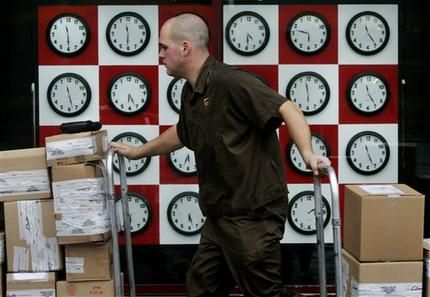Другие журналы
scientific edition of Bauman MSTU
SCIENCE & EDUCATION
Bauman Moscow State Technical University. El № FS 77 - 48211. ISSN 1994-0408
Power grid change may disrupt clocks
25.06.2011
 A yearlong experiment with the nation's electric grid could mess up traffic lights, security systems and some computers - and make plug-in clocks and appliances like programmable coffeemakers run up to 20 minutes fast.
A yearlong experiment with the nation's electric grid could mess up traffic lights, security systems and some computers - and make plug-in clocks and appliances like programmable coffeemakers run up to 20 minutes fast. "A lot of people are going to have things break and they're not going to know why," said Demetrios Matsakis, head of the time service department at the U.S. Naval Observatory, one of two official timekeeping agencies in the federal government.
Since 1930, electric clocks have kept time based on the rate of the electrical current that powers them. If the current slips off its usual rate, clocks run a little fast or slow. Power companies now take steps to correct it and keep the frequency of the current - and the time - as precise as possible.
The group that oversees the U.S. power grid is proposing an experiment would allow more frequency variation than it does now without corrections, according to a company presentation obtained by The Associated Press.
Officials say they want to try this to make the power supply more reliable, save money and reduce what may be needless efforts. The test is tentatively set to start in mid-July, but that could change.
Tweaking the power grid's frequency is expensive and takes a lot of effort, said Joe McClelland, head of electric reliability for the Federal Energy Regulatory Commission.
"Is anyone using the grid to keep track of time?" McClelland said. "Let's see if anyone complains if we eliminate it."
No one is quite sure what will be affected. This won't change the clocks in cellphones, GPS or even on computers, and it won't have anything to do with official U.S. time or Internet time.
But wall clocks and those on ovens and coffeemakers - anything that flashes "12:00" when it loses power - may be just a bit off every second, and that error can grow with time.
It's not easy figuring what will run fast and what won't. For example, VCRs or DVRs that get their time from cable systems or the Internet probably won't be affected, but those with clocks tied to the electric current will be off a bit, Matsakis said.
This will be an interesting experiment to see how dependent our timekeeping is on the power grid, Matsakis said.
The North American Electric Reliability Corp. runs the nation's interlocking web of transmission lines and power plants. A June 14 company presentation spelled out the potential effects of the change: East Coast clocks may run as much as 20 minutes fast over a year, but West Coast clocks are only likely to be off by 8 minutes. In Texas, it's only an expected speedup of 2 minutes.
Some parts of the grid, like in the East, tend to run faster than others. Errors add up. If the grid averages just over 60 cycles a second, clocks that rely on the grid will gain 14 seconds per day, according to the company's presentation.
Full text of the article - on physorg.com website
Photo: from physorg.com website
In this Oct. 10, 2005 file photo, UPS delivery man Chris Carhart of South Boston, wheels packages past a store window featuring clocks at Quincy Market in Boston. Our power supply has been so precise we've set our clocks by it _ but time is running out on that idea. A yearlong experiment with the electric grid may make plug-in clocks and devices like coffeemakers run up to 20 minutes fast. (AP Photo/Charles Krupa, File)
| Authors |
| Press-releases |
| Library |
| Conferences |
| About Project |
| Phone: +7 (915) 336-07-65 (строго: среда; пятница c 11-00 до 17-00) |
|
||||
| © 2003-2024 «Наука и образование» Перепечатка материалов журнала без согласования с редакцией запрещена Phone: +7 (915) 336-07-65 (строго: среда; пятница c 11-00 до 17-00) | |||||



